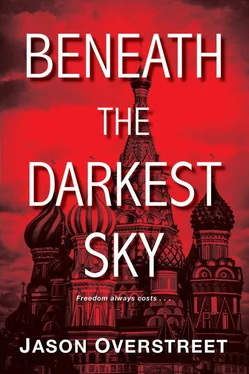“The only thing that’ll kill you is that Road of Bones out there,” he said, pointing west.
“I have a plan,” I whispered in his ear. “I don’t want to talk about it out loud, but just trust me. I’m going to try to get you out of here with James and me.”
* * *
Later that night, as I lay in my middle bunk, I penned a letter to Loretta—one that Koskinen had said might or might not ever reach her. He claimed that Colonel Ivan Zorin, the head of the camp where she was near Finland, was a brutal, evil son of a bitch. Not allowing prisoners to receive any letters was something Koskinen said was “likely” in the case of Zorin.
I’d heard him loud and clear but wanted to send the letter anyway, for I had the distinct feeling that Loretta and Ginger were in serious trouble. Each night, as of late, I’d been having terrible nightmares about their condition, both of them on the verge of death. It was haunting me. Perhaps I was hoping this letter would reach her, if only so it might be the last words she ever heard from me. I’d always trusted my instincts, and they were telling me that time may have already run out for them. So, with the heaviest heart I’d ever had, I put pen to paper and wrote the following:
Dear Loretta,
My God, my love, how I long to see your face, touch your skin, and smell your essence again. Our lives turned upside down in the blink of an eye. Tell my daughter I love her beyond this universe. Tell her to look up at the Russian sky and search for the brightest star, for that is the one I see tonight, and it reminds me of her, my sweet Ginger. I have died a thousand deaths since being ripped away from you two. Yet I must have a thousand and one lives because my heart still beats and my mind still imagines the moment we will be reunited. Your son is so strong, this young man we created. He has seen far too much ugly, cried too many tears, felt too much pain, but he is still whole and full of life and hope because he was raised by you, an awesome, relentless, spirited, artistically transcendent woman. My weakest, darkest, pain-filled moments are always replaced with strength, light, and joy when I think of you, my gorgeous Loretta. I will never give up on you, on us, on the dreams we have for our children. I will stay alive for us. I will hold you again. I will make our family whole again. I will make love to you again. Life will begin again. I promise.
Faithfully, Prescott
Moscow, Russia
May 1936
MAY 16, 1936, BROUGHT WITH IT SOME BIG NEWS. NOT ONLY HAD Bullitt’s tenure as ambassador come to an end, much to his delight it appeared, but Bobby had also accepted a higher-ranking post as Minister in Argentina. Loretta and I had just found out and hadn’t discussed whether we’d be joining the Ellingtons, even though Bobby had already invited us. Everything was happening so fast.
This was also another important and exciting day for Loretta. Two of her paintings had been chosen to be displayed at Tretyakov Gallery across the river from the Kremlin. Tretyakov was known as the premier depository of Soviet art in the world. Bobby, Dorene, Loretta, and I had chosen this night to dress up and tour the gallery before heading to a black-tie dinner at the French Embassy.
As we walked the gallery, we came upon one painting that Loretta told us to stop and enjoy. It was a work by Boris Ioganson, a famous Russian artist.
“This will go down as Boris’s greatest painting,” said Loretta. “It’s called Interrogation of Communists . I believe it has been displayed here for three years now. I actually met Boris a year ago while visiting the All-Russian Academy of Arts in Leningrad. He was so nice to me, and we’ve been friends ever since. He visits Moscow often. I consider him a mentor.”
“Oil on canvas,” I said, kissing Loretta on the cheek. “Just like yours.”
“How old is Ioganson?” said Bobby.
“I believe he’s around forty-three,” said Loretta. “Five years older than me. Yikes! That’s so weird coming out of my mouth. Feel like I’m getting older by—”
“Stop,” said Dorene, “you look twenty-five. Don’t worry.”
“Yeah, you say that only because you’re just thirty-four,” said Loretta.
“Hell, you both look eighteen to my eye,” said Bobby, smiling and taking his wife’s hand.”
“God, I love you, Bobby,” said Loretta, turning back to the painting. “Kiss him for me, Dorene! Anyway, if I might, this piece represents the new man fighting against the old… you know, the brave proletariat not flinching as these brutal czars interrogate them.”
“I’m also noticing,” said Dorene, “how the faces of the young man and woman who represent the proletariat are lit up, while the faces of the three czarist army officers appear dark. The man and woman appear bold, not afraid of these men.”
“True Socialist Realism,” said Loretta.
“Hmm,” said Bobby. “What exactly is Socialist Realism again?”
“You sound suspicious,” said Loretta.
“No, not at all, just curious.”
“Well,” said Loretta. “It was explained best by Andrei Zhdanov, an aide of Stalin’s. Most artists here have his words stained in their brains. And Stalin himself gave Zhdanov’s explanation his stamp of approval.”
“Tell us,” said Bobby.
Loretta cutely closed her eyes and began. “Zhdanov said, ‘Socialist Realism, being the basic method of Soviet literature and criticism, requires from the artist truthful, historically concrete representation of reality in its evolutionary development. Moreover, truth and historical completeness of artistic representation must be combined with the task of ideological transformation and education of the working man in the spirit of socialism.’ ”
Moments later when we arrived at Loretta’s two paintings, my heart began to race, as I hadn’t seen either. They were nothing like those I’d looked at before, no women holding babies in either. One was a painting of two young proletariat boys in civilian clothing chasing two uniformed czars who had looks of fear on their faces. The other was a similar painting, but the two young chasers were girls. Both were so vivid and colorful, as if they were photographs that had simply been copied. That was how truly talented my wife was.
“Stunning!” said Dorene.
“Truly!” said Bobby.
“My gosh, Loretta!” I said, taking her around the waist and pulling her close.
“You’re all being far too kind,” said Loretta, such pride washing over her. “They represent the true fear that was instilled in the czars as the revolution drew to an end. They feared the Bolsheviks at this point so much so that even the mere sight of proletariat children scared them to death. They knew that lingering not too far behind these youngsters was likely a heavily armed brigade of angry Bolshevik soldiers. At the same time, these children symbolized this newfound, emboldened attitude that had permeated the whole of the proletariat. This one is called Proletariat Boys Rising Up , and the other is called, of course, Proletariat Girls Rising Up .”
“The color is just stunning,” said Dorene. “But it’s as if you’ve used only various shades of red, yellow, black, and white. And still, it pops off of the canvas so powerfully, the girls’ lemon dresses, the boys’ cherry pants.”
“Thank you,” said Loretta. “In terms of color, probably the great artist, Konstantin Melnikov, gave me the greatest compliment. He said I must have found a way to paint with molten lava.”
“But you’ve always had a flair for color,” I said, turning to Bobby and Dorene. “Our daughter’s namesake, Ginger Bouvier, from our Harlem and Paris days, liked to brag about Loretta’s talent for creating various shades of particular colors.”
Читать дальше











